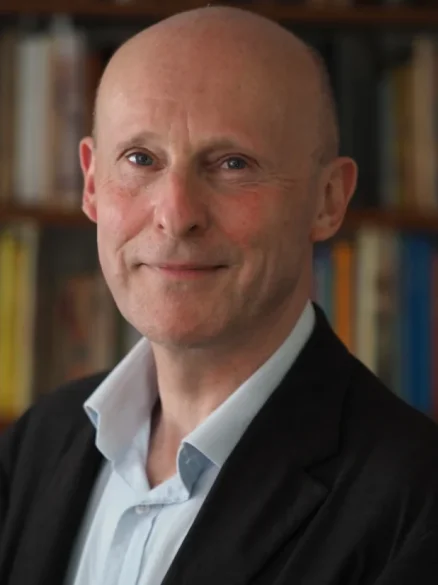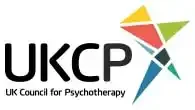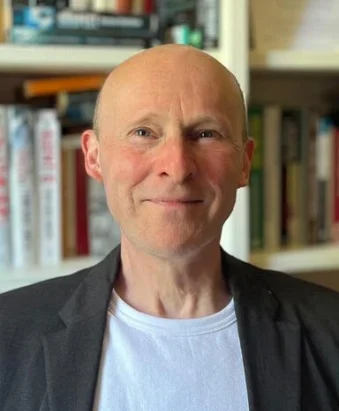Welcome to Paul Carter Therapy
Are you facing a tough time, feeling stuck and struggling with confused and difficult emotions?
Would you like to wake up tomorrow feeling different from today?
I offer psychotherapy and counselling in a confidential, non-judgemental and comfortable setting. In this safe space you can start to explore, understand and address underlying repeating patterns which may prevent you from moving forward or living a more fulfilling life.


About me
I am a fully qualified UKCP accredited and BACP registered psychotherapist trained in adult psychotherapy and counselling. I work with adults across all age groups, backgrounds and levels of distress, offering short and long-term therapy at my private practices and also online.
Besides private practice, I have NHS experience as an honorary psychotherapist working at the South London and Maudsley NHS Foundation Trust (SLaM) - one of the UK's leading providers of mental health services, where I have worked with highly traumatised patients on one-year contracts. I have also conducted short term psychotherapy with recovering addicts in a residential drug and alcohol substance abuse rehabilitation centre. I currently teach Psychotherapy and Counselling as a Visiting Lecturer at Regent's University, London.

Training and Qualifications
PGCIP Psychotherapy and Counselling - Regent's University, London.
M.A. Psychotherapy and Counselling (Distinction) - Regent’s University, London.
Foundation Certificate in Psychotherapy and Counselling - Regent's University, London.
Introductory Lectures and Seminars - completed at the Institute of Psychoanalysis, London.
M. Phil (Cantab.) International Relations - Queens' College, University of Cambridge.
B.A. (Econ) (Hons) - University of Manchester.
I am an accredited UK Council for Psychotherapy (UKCP) psychotherapist (registration number 2011182780) and registered member of the British Association for Counselling and Psychotherapy (BACP) (registration number: 399568). I abide by their professional code of ethical practice for matters of confidentiality, supervision, complaints and continuing professional development.
I accept referrals from various health insurance providers such as Allianz, Aviva, AXA Health, Vitality and WPA.


How I Work
We are all individuals with a unique way of being in the world. I work as an Integrative Psychotherapist, meaning I draw on various theories and approaches personally suited to your unique needs.
The experience of being listened to non-judgementally, feeling heard and understood can bring deep relief from distress, with such greater self-awareness setting you on a new path with yourself and others.
My therapy approach is exploratory, supportive, and collaborative. Initially, you may find it helpful for us to explore your past in order to understand links with your present patterns of behaviour, attachment relationships and feelings. We can then work out your true needs and what choices may achieve them in a positive and practical way.
What issues can therapy help with?
People come to me for help a wide range of issues. Some of the more common difficulties that can be supported:
Feelings of anxiety, panic attacks and work-related stress
Grief, loss or bereavement
Anger management
Problems with addiction – drugs, alcohol, sex, over-working
Relationships and problems with family life – children, affairs, separation and divorce
Trauma and dissociation
Abuse – physical, emotional, sexual and domestic
Loss of meaning, purpose and direction
Adverse childhood experiences
Depression, loneliness and sadness
Problems with confidence, low self-esteem and life transitions
Issues relating to sexuality
Disorders – personality, attachment, mood, OCD, PTSD and ADHD
Difficulties at work or in retirement
My Location
The Storey Institute
Meeting House Lane
Lancaster
Lancashire
LA1 1TH
My Location
Borough House Therapy Rooms
78-80 Borough High Street
London Bridge
London
SE1 1LL

Sessions and Fees
Please contact me directly to discuss availability and fees. I hold some reduced-fee spaces for those who might need them.
I offer a free twenty-minute initial video or phone consultation to assess and explore your presenting issues. This will give you a feel for how I work and allow you to express your hopes and expectations for therapy and ask any questions you may have. You would then usually come on a weekly basis for 50-minute sessions at a regular time and day.
Get in touch
Feel free to contact me if you have any questions about how therapy works,
or to arrange a free twenty-minute video initial assessment appointment.
This enables us to discuss the reasons you are thinking of coming to therapy, whether it could be helpful for you and whether I am the right therapist to help.
You can also call me on 07976 268 519 if you would prefer to leave a message or speak to me first. I am happy to discuss any queries or questions you may have prior to arranging an initial appointment.
All enquires are usually answered within 24 hours, and all contact is strictly confidential and uses secure phone and email services. Find out more by reading my Privacy Policy.
Some frequently asked questions
I tailor therapy to individual needs and offer both shorter-term counselling and longer-term psychotherapy. Counselling addresses immediate problems of concern. This can include issues with relationships, abuse, lack of confidence, anger management or bereavement. Psychotherapy looks at repeating patterns of behaviour such as anxiety and depression, addictions or personality issues which are causing you distress. These may originate from childhood experiences or trauma which requires deeper work as the origin may not be immediately obvious.
Some people like to have a specific number of therapy sessions, with reviews, while others want open-ended therapy. You can decide or we can mutually agree on the duration and when to end therapy. I always provide an ending session to review the work, assess the progress made and consider what an ending means.
We'll discuss in more detail why you are coming to therapy. I shall then conduct an assessment in order to explore your concerns. From that we'll mutually discuss a framework for how we can work together to explore your presenting issues, try to understand them better and how we can change repeating patterns to live a different and more fulfilled life.
Coming to therapy is a brave step. I liken it to an act of rebellion - you've finally had enough of suffering, and feeling stuck and you want to seek comfort from issues causing you distress. Ibsen in his play Ghosts writes, 'It is the very mark of the spirit of rebellion to crave for happiness in this life'. My role as your therapist is to support that rebellion.
The therapeutic space we create will be non-judgemental, safe and healing. Therapy is an opportunity to unburden yourself of how you feel, the pain suffered, the difficulties of this and your desire for change.
Freud said 'We can't bury pain - it doesn't decompose'. Therapy allows you to take pain, trauma and associated negative emotions and difficult feelings out of the darkness and expose them to the cleansing power of sunlight.
It can be very emotional and challenging. That's ok. You'll be in a safe and contained environment and if necessary I shall apply the brakes rather than the accelerator such that we proceed at a pace that such emotions and feelings can be processed effectively. So be yourself, be authentic and allow yourself to describe material that you might be explaining for the first time.
As a registered practitioner I adhere to the ethical framework of my professional bodies, the UKCP and BACP. This includes responsibility to manage your information confidentially and in line with GDPR. Confidentiality means that I will treat your personal information and what you share with me with utmost care and respect, and in line with UKCP and BACP ethical guidelines. Occasionally I share clinical work with my accredited supervisor who is also bound by confidentiality. However, this is always done on an anonymised basis.
Therefore, whatever happens or is said in therapy stays between you and me. This only tends to be broken should any safeguarding issues arise. These could include any risk of harm to your own health or that of other people. If such a situation arises then I am legally and ethically bound to raise my concerns to my supervisor and / or your GP. I would always aim to discuss this with you before making any disclosure.
Therapy is an opportunity for you to discuss and process matters that may have remained unsaid to anyone previously. It is unlike any other conversation especially those we have with friends or relatives. It is important that you open up about difficult matters and you may feel uneasy, embarrassed or ashamed doing this in front of people who are close to you.
This is especially the case when friends or relatives may be part of the problems you wish to bring to therapy. Therefore, I always see clients on their own, unless it is a couples counselling or therapy session.
I do understand that coming to therapy alone for the first time can create anxiety. However, such feelings are normal and once you settle into the process it will become less daunting.
© Paul Carter Therapy
powered by WebHealer
